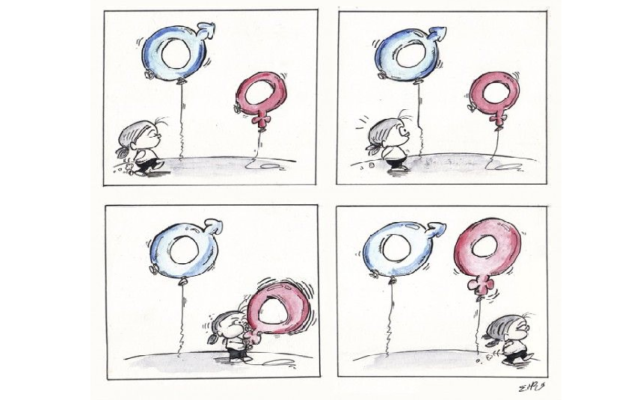The Reality of Feminism
By Elizabeth Friedly | efriedly@atljewishtimes.com
I feel a response is warranted in the case of Rabbi Shlomo Pinkus’s recent piece entitled “Feminism vs. Chauvinism” [see the May 3rd edition of the AJT].
We commend the author’s recognition of the “glass ceiling” and his assertions of equal worth. Nevertheless, I think there is a great misunderstanding among readers (and the population at large) as to what “feminism” and “chauvinism” mean, respectively. This calls for an obligatory visit to the dictionary. Merriam-Webster lists feminism as “the theory of the political, economic and social equality of the sexes.”
In contrast, chauvinism is defined as “undue partiality or attachment to a group or place to which one belongs or has belonged” – in this case, favoring masculinity over the feminine. Feminism and chauvinism are not at all similar, nor is it appropriate to compare them as if they were. The writer claims both “have also hindered and separated.” Yes, by definition, male chauvinism hinders females in favor males. Feminism defines a need and addresses inequalities specific to women.
Next, the author builds on his incorrect definition of feminism by asking: “Why is any form of pride in a person’s gender considered a good trait?”
Simply put, pride is the opposite of shame. There is a degree of pride in feminist ideology, but it is in the sense of self-worth, in believing you’re worthy of said equal treatment. Pride in one’s womanhood is indeed a good trait. As a segment of society that has been subjected to various forms of oppression throughout history – whether it be the denial of voting rights, discrimination in the workplace or the general pervasive threat of sexual assault. Pride in our shared history and resilience amidst struggles is not inappropriate or unfounded.
In fact, it is often an important tool of empowerment at this stage. A sense of pride in the very thing which society has endlessly taught us to be ashamed of (femininity) is integral to counteracting current negativity.
Masculinity is valued over femininity in our society; it’s a well-documented phenomenon. To be called a “girl” is an insult – it’s synonymous with weakness and frivolity. And yet, many still try and debate the existence of this imbalance; they often disregard larger statistics in favor of personal feelings or experiences.
Still, continuing on his line of reasoning, Rabbi Pinkus next asks: “Why take pride in something as empty as a peel?” The use of the descriptor “empty” in reference to womanhood – genital anatomy or the outward physical indicators of gender belies reality. This implies that either is negligible or inconsequential. They are anything but. Only the privileged few can pretend physical features have no bearing on their treatment or success. Whether we like it or not, our gender still very much affects our daily lives; from legislature targeted at women down to the minute personal interactions. To deny this is both willfully blind and insensitive.
The author, on the other hand, further categorizes a political movement as a cosmetic triviality: “We must shed our outer layers, be they feminist or chauvinist.”
This call to action piques my concern, as the world does not need chauvinism, but it does (in fact, desperately) need feminism. Consider that in Brazil, a woman is assaulted every 15 seconds, and in Pakistan, 14-year-old Malala Yousafzai was shot in the head to stop her from speaking out for women in education. According to National Institute of Justice and the Centers of Disease Control and Prevention, 1 in every 4 women will experience domestic violence in her lifetime. Faced with facts like that, we need to assert our worth as well as our strength and combat the horrifyingly prevalent attitudes which allow for this kind of mistreatment.
But don’t stop there: Also consider that women own only one percent of the world’s land, that gender-based violence kills 1 in 3 women worldwide, that 2 million girls ages 5 to 15 are forced into the commercial sex market each year, that women make up 70 percent of the world’s poor and that 600 women were raped every day in the U.S. as of 2006.
Taking this into account, feminism is a vital “–ism” and a vital movement, not an “outer layer” to be shed. However you choose to define it or label it, the fight for women isn’t over.
Rabbi Pinkus makes a critical mistake in reasoning when he says: “There is no pride in things that we had no choice over.” Gender can indeed be a choice, but that’s a discussion for another day. Volition or choice has little bearing on a person’s relative right to experience self-confidence or empowerment. Centuries of children born into Jewish families have taken pride in their history and culture regardless of whether they chose the faith or their lineage.
We shouldn’t fear an organized movement or try to write it off as “divisive” when this great country exists as-is today because of groups who championed specific human rights. Of the billions people on Earth, there are undoubtedly women and men who have taken radical actions in the name of feminism, but these select few do not represent an entire philosophy. This holds true for a variety of causes and groups.
It’s natural to feel strong emotions such as distress in reaction to individuals questioning age-old traditions. It’s unfamiliar and sometimes upsetting, but human beings are nothing if not known for our ability to evolve. Our imaginations and our aspirations destine us for greater things.




comments